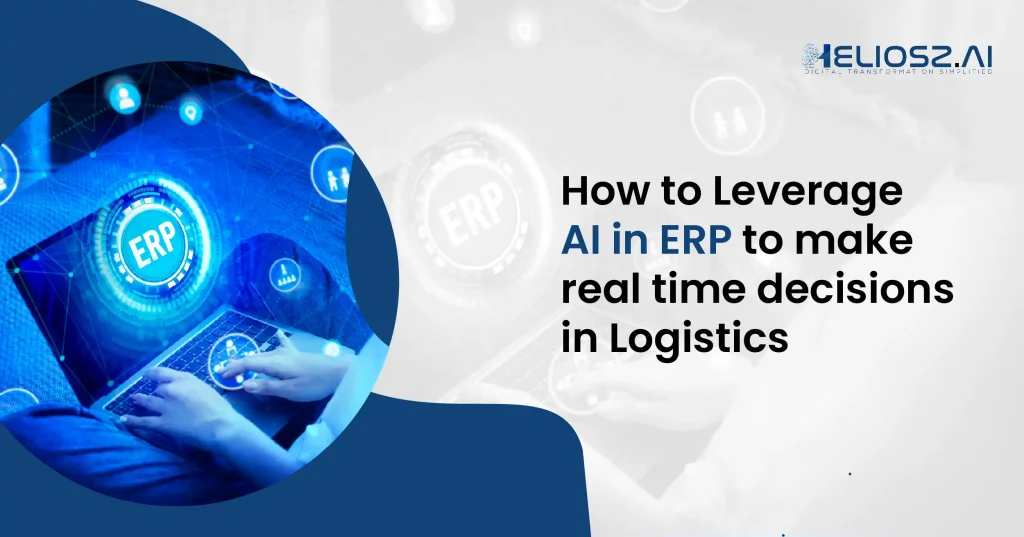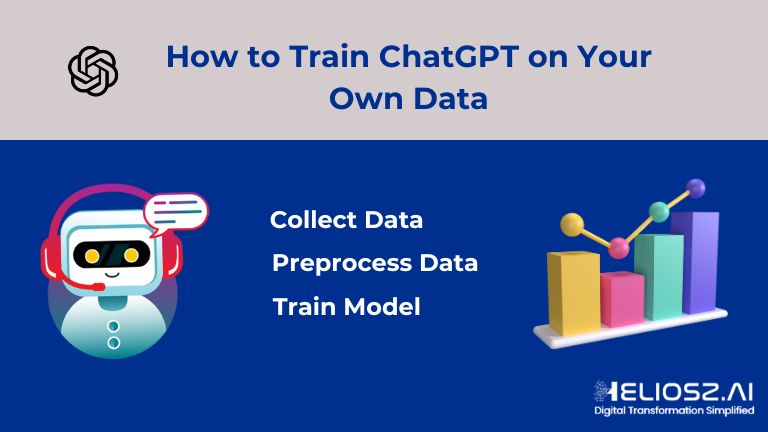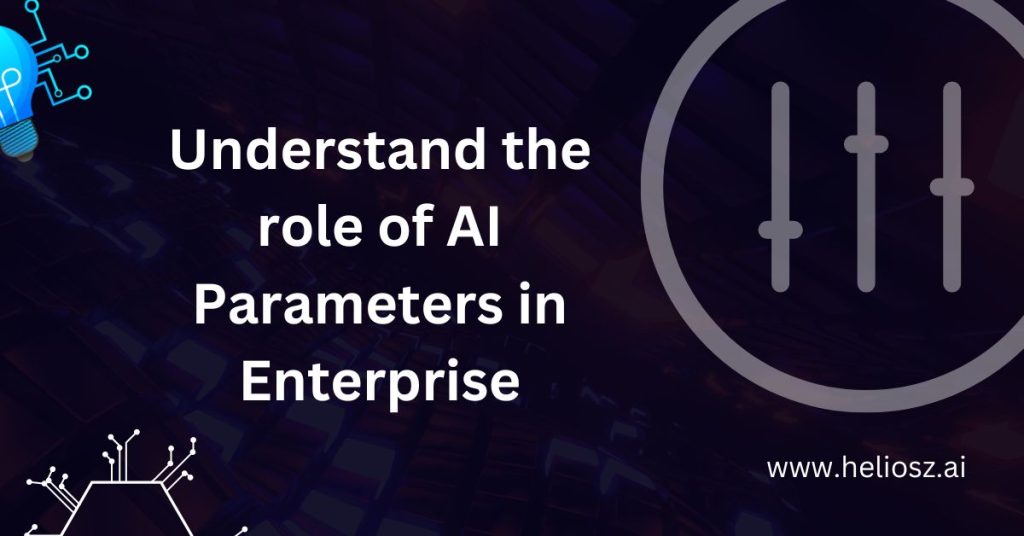
The combination of artificial intelligence (AI) and enterprise resource planning (ERP) systems is opening up an entirely new era of operational efficiency and strategic decision-making. Given the rapid pace of logistics and the key importance of the accuracy and timeliness of information, AI-powered ERP solutions have become a way to stand out from the hyper-competitive business crowd. By using advanced elements of artificial intelligence, businesses can optimize their inventory chains, which empowers them to improve their customer satisfaction level, which, in turn, is a revenue driver.
Let’s have a detailed discussion on how to leverage AI in ERP to make real-time decisions in logistics. This article is the only informative guide you might need if you are planning to utilize artificial intelligence and ERP to drive success in the logistics business.
Table of Contents
- Scope of AI in ERP
- Main Advantages of Integrating AI with ERP System
- Efficient Ways of Leveraging AI
- Heliosz.AI Solutions
- Final Thoughts
Scope of Artificial Intelligence in ERP
AI in the context of ERP represents the employment of these systems to boost the performance and the functionality of ERP systems. The provision of AI in ERP is large, and it covers some applications that are not restricted to forecasting analytics, automation of everyday duties, and intelligent data processing.
Machine Learning (ML)
Machine Learning, the closest AI form, is a science in which these algorithms are taught how to learn from data. It is a process of detecting patterns and thus forecasting and making predictions is carried out. For example, a computer system can be used to do tasks such as demand forecasting, financial analysis, and fraud detection.
A case in point is the use of the data inventory system for a company that uses the ML algorithm to forecast demand for a certain period using the data of prior actual sales. With ML, the companies will therefore be able to make such decisions as inventory level keeping and whether to shorten the stock.
Natural Language Processing (NLP)
Natural Language Processing is what helps ERP systems become intelligent enough to understand and respond to human language. It is helpful when technology allows the user to communicate with ERP systems using either voice or text commands and making it more user-friendly and accessible.
NLP as a tool can be used to make machines handle customer service, develop reports, and mentor in finding data or info more straightforwardly.
Robotic Process Automation (RPA)
Robotic Process Automation is the process that uses software robots to carry out and/or complete routine and repetitive tasks. The use of RPA in ERP systems can include such tasks as data entry, invoice processing, and report generation.
Automation speeds up the processes, so the mistakes made by the staff are minimized, productivity is increased, and the staff can be involved in the strategic operations of a company.
Predictive Analytics
The utilization of forecasting models to predict outcomes in a particular field of interest is predictive analytics. This technology is also being used in some systems to achieve market forecasting, risk identification, and optimization of business processes. In one of the scenarios, predictive analysis can derive future sales trends and make decisions on which products to produce and sell.
5 Main Advantages of Integrating AI with ERP Systems
Enhanced Decision-Making
The establishment of AI in ERP systems is to a significant extent a solution for the issue of increased decision-making capacity. AI through advanced analytics and real-time insights allows companies to depend on data for decision-making. What is learned from the new technology is reflected in more accurate production forecasts, better financial planning, and smarter decisions.
Increased Efficiency
ERP systems, that are AI-based, perform automation of a large number of functions within ERP, resulting in increased operational efficiency. Functions used to solely be done through the manual by the entry of data and report creation can now be done with the help of AI-laden systems. The automation of these duties leads to lower time for processing and costs of operations while avoiding mistakes.
Improved Data Accuracy
AI as a reliable tool boosts data accuracy by using algorithms to detect anomalies, validate data, and ensure consistency. For ERP systems, the outputting of more reliable data for reporting and analysis is made possible. The better accuracy of data is the gateway to getting better business insights and making more informed decisions.
Scalability and Adaptability
The latest ERP systems which are AI-based provide the best in terms of scalability and adaptability when it comes to different business environments. Through the use of AI, data can be enhanced and hence can accommodate even the increasing size of the files and more intricate processes as businesses cannot be static.
Moreover, AI tools can adjust to new business requirements and market conditions, guaranteeing that the ERP system will continue to be productive and efficient.
Enhanced User Experience
AI techniques like the use of NLP and analytics are responsible for a remarkably pleasant and intuitive experience for the user in an ERP environment. Users are now able to deal intelligently with the system, find their way through the data, and even have the system make personal recommendations. The user’s progress is further consolidated with improving user experience and satisfaction.
Efficient Ways of Leveraging AI for Real-Time Logistics Decisions
The integration of Artificial Intelligence (AI) with Enterprise Resource Planning (ERP) systems offers transformative capabilities for logistics management. This section will elaborate on how AI-enabled ERP solutions will drive real-time decisions in logistics.
Predictive Analytics and Demand Forecasting
Forecasting Accuracy
Predictive analytics-driven ERP systems make use of AI to forecast demand more accurately. These systems generate demand forecasts based on records from past periods, current market tendencies, and external factors such as the economic climate and customer whims such as moody behavior which let the systems give more accurate forecasts. This particularity allows logistics managers to come up with future estimations, manage inventory, and reduce stockouts and overstock situations.
Dynamic Adjustment
It’s not just static predictions but the artificial intelligence framework first and foremost provides us with the ability to make predictions based on the analysis of the last century and other data. Linked to the principal AI concept, which is the continuous improvement of technologies, these systems adapt to real-time data inputs, thus providing instant adjustments to warehouse inventory and supply chain strategies. Besides, it is this mobility feature that ensures logistics operations remain responsive to demand changes or market fluctuations.
Scenario Planning
Scenario planning and predictive analytics are twins since the latter contains the former as a part of its soul by actually creating intelligent simulations that will bring in the needed information and then scouting through all the possible outcomes to find the best routes to navigate through obvious or non-obvious danger signs. Accordingly, logistics managers can visualize the outcomes of different supply chain disruptions or customer demand change scenarios and make appropriate changes to those plans.
Automated Inventory Management
Real-Time Inventory Tracking
AI-based integrated enterprise resource planning systems foster the obtainment of the needed information on stock counts and movements at the exact moment they get carried out thus making it possible to avert stockouts and slashed inventories. Fine-tuned algorithms using AI processing manage the inventory at multiple locations automatically, taking stock and alarming discrepancies or shortages to managers are the common things that happen more and more often.
Automated Replenishment
The AI is rapidly clipping on the wing of inventory replenishment by examining the data categorically on consumption, lead time, and supplier performance. The system can also be programmed, for instance, to automatically generate purchase orders when the quantity of goods falls below the minimum prescribed level of the setting or to schedule restocking processes. Thus, manual intervention is reduced, while at the same time, the system can play the role of a watchdog over the inventory levels and demand suppliers deliver the required parts on time.
Inventory Optimization
ERP powered by AI uses cutting-edge technology to manage inventory by not only predicting future stock needs but also making run-time adjustments of the orders placed accordingly. The minimization is realized through the reduction of holding costs and minimizing inventories in the supply chain.
Optimization of Supply Chain Operations
End-to-End Visibility
AI allows for end-to-end visibility in supply chain operations by consolidating data from different sources, including suppliers, manufacturers, and distribution centers. This wide-eye vista lets logistics managers observe and assess the entire supply chain in real time, which in turn makes them able to discern bottlenecks and inefficiencies.
Supplier Performance Management
Artificially intelligent ERP systems measure supplier performance by taking into account criteria such as delivery times, quality of products, and stable relationships. Logistics managers, guided by this kind of evaluation, can take the well-founded position either in selecting the best seller, negotiating better terms, or appropriately addressing the issue.
Process Optimization
Supply chain AI analyzes unproductive processes and suggests the following successful steps. AI enhances global supply chain efficiency and reduces operation expenses through such operations as procurement, production scheduling, quality control, and distribution strategy optimization.
Enhanced Route Planning and Transportation Management
Route Optimization
AI technology is used in ERP systems for running networks by carefully analyzing various elements such as traffic, weather, and delivery timing. With this, optimization is achieved with fewer transit times, less fuel consumption, and an increase in delivery accuracy. The data that rolls in real-time is such that the system is capable of planning changes without human intervention in case the variables of the environment mandate to do so.
Fleet Management
AI has brought about the upgrade of fleet management by monitoring the performance of vehicles, tracking their fuel consumption, and analyzing driver behavior. The experience of logistics and support managers with the help of such data enables them to execute with less intricacy, cut down maintenance costs, and bring about the best possible before working.
Real-Time Tracking and Alerts
AI-controlling ERP systems provide us with shipments and delivery movements which can be tracked on a live interactive map, showing where the items are at any given time. The alerts are automatic systems that send out messages of warning, in cases when there is a brake in the delivery process through changing the right path, a driver is taking.
Heliosz.AI: Empowering Logistics Businesses to Thrive
Heliosz.AI invites you to be a partner dedicated to the logistics revolution powered by cutting-edge ERP technologies and the most advanced artificial intelligence. Conspicuous amongst the logistics shortcuts that we normally use, joining Heliosz.AI will mean access to all-embracing ERP technologies that offer competitive predictive analytics tools, automated inventory controls, and real-time decision-making capabilities. By using these AI-driven solutions to improve your supply chain, you improve your routes, and consequently, you surpass the competition.
Do not wait to miss the chance to boost effectiveness, cut expenses, or raise the quality of your delivery. Contact Heliosz.AI now and let’s discuss how we can drive your logistics together to the heights of success!
Final Thoughts
Leveraging AI-powered ERP systems for rapid decision-making in logistics has vast advantages, among them the improvement of forecasting accuracy, automatic inventory management, supply chain efficiency, and planning. Besides the use of AI power, companies can reach higher efficiency, response, and agility in logistics operations. AI-based ERPs let transportation managers be informed through real-time data and predictive analytics to make decisions that lead to the best supply chain practices and ideal customer service.


